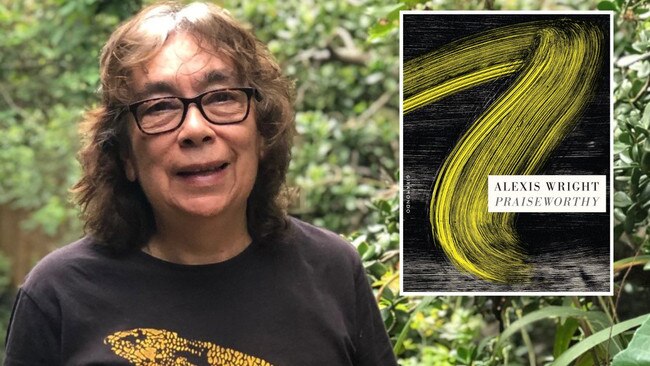Alexis Wright wins the Stella Prize a second time for novel Praiseworthy
Alexis Wright has become the first person to twice win the Stella Prize for Literature and says she is not too shy to take questions from the floor at the Melbourne Writers Festival, even on the tricky Israel-Palestine question.

Alexis Wright has become the first person to twice win the Stella Prize for Literature, this time for a 727-page novel rather appropriately called Praiseworthy.
Wright, 73, who won the Stella in 2018 for a nonfiction worked called Tracker, accepted her prize at a ceremony at the State Library of Victoria on the eve of the Melbourne Writers Festival.
Both institutions – the library, and the festival – are beset by Israel-Palestine drama, about which Wright has mixed feelings.
The festival, which kicks off on May 6, has banned all questions from audiences this year, citing the febrile “climate” in which anti-Israel groups are trying to bully festival organisers into cancelling events by Jewish writers.
The festival has also been dealing with the departure of its deputy chair, Leslie Reti, who quit in dismay after anti-Israel rhetoric made it into the official program.
The State Library is weathering a storm of similar nature and ferocity: management stands accused of censorship, after some teenage writing workshops by pro-Palestinian writers were cancelled, without explanation.
Hundreds of Australian writers, among them Miles Franklin winner Michelle de Kretser and Indigenous writer Tony Birch, have signed an open letter calling for workshops to be reinstated.
Wright told The Australian she wasn’t aware of “anything that goes on social media. I am not on it. The work I do requires sustained concentration.”
She described the festival’s decision to ban questions as a “sad thing. I know that the audience likes to pose questions to writers. And it’s disappointing.” She said she wasn’t personally afraid to answer questions about Israel-Palestine, the fear of which does seem to be behind the move to can all questions.
Wright said: “I don’t think what is happening there – war – is the answer for anything. Not for Israel, not for Palestine … if people want to ask me a question, you know, from the floor, I’ll be happy.
“For me, censorship doesn’t work, because it seems for a long time that the First Nations voice was the censored voice in Australia, and Indigenous people, their lives even, were being censored.
“We were not in a position where we could really work towards our own future. That’s very crucial for us, to be able to do that, and I’m working on those issues, working very hard to make sure every page of the books I’m writing hold up.”
Wright receives a cheque for $60,000 for winning the Stella, and she’s pleased to receive it, but “obviously, I’m not writing for the dollars.” (If she was, on a per word basis, she’s hardly being paid.) Her book is weighty in volume because the themes – dispossession, and climate change – are “so important, and huge. Honestly, we need, with the scale of what’s happening in the world … I felt we needed a work that was big enough to capture all the issues.”
The protagonist in Praiseworthy, published by Giramondo, is named Cause Man Steel, and he has a vision to use Australia’s five million feral donkeys for transport, once the planet runs out of fuel. In the process, he hopes to secure the future of his people.
“The story is centred on an Aboriginal community,” Wright said. “We are still trying to find ways to survive.”
Wright’s ancestors come from Queensland’s remote Gulf Country; the author was born and raised in Cloncurry, 120 kilometres east of Mount Isa, but now lives in Melbourne.







To join the conversation, please log in. Don't have an account? Register
Join the conversation, you are commenting as Logout